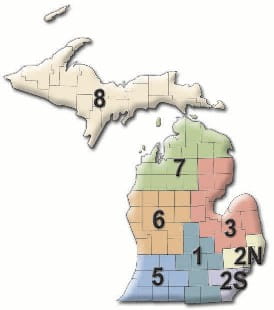The web Browser you are currently using is unsupported, and some features of this site may not work as intended. Please update to a modern browser such as Chrome, Firefox or Edge to experience all features Michigan.gov has to offer.
Long Term Care Disaster Planning Resources
Featured Resources
- LARA Partner Resources
- Omnibus Burden Reduction (Conditions of Participation) Final Rule CMS-3346-F -9/26/19
- CMS Emergency Planning Checklist: Michigan Planning Toolkit
- CMS State Operations Manual Appendix Z-Emergency Preparedness for All Provider and Certified Supplier Types Interpretive Guidance
Regulations and Waivers
Regional and Local Contact Information:
To the right, you will find a map of the 8 regional healthcare coalitions. Identify in which county your facility resides to determine your designated region.
-
Region 1: Clinton, Eaton, Gratiot, Hillsdale, Ingham, Jackson, Lenawee, Livingston, and Shiawassee Counties
-
Region 2N: Oakland, Macomb, and St. Clair Counties
-
Region 2S: City of Detroit; Monroe, Washtenaw, and Wayne Counties
-
Region 3: Saginaw, Alcona, Iosco, Ogemaw, Oscoda, Arenac, Gladwin, Midland, Bay, Genessee, Tuscola, Lapeer, Sanilac, and Huron Counties
-
Region 5: Allegan, Barry, Calhoun, Branch, St. Joseph, Cass, Berrien, Van Buren, and Kalamazoo Counties
-
Region 6: Clare, Ionia, Isabella, Kent, Lake, Mason, Mecosta, Montcalm, Muskegon, Newaygo, Oceana, Osceola, and Ottawa Counties
-
Region 7: Manistee, Wexford, Missaukee, Roscommon, Benzie, Leelanau, Grand Traverse, Kalkaska, Crawford, Antrim, Otsego, Montmorency, Alpena, Presque Ilse, Cheboygan, Emmet, and Charlevoix Counties
-
Region 8: Chippewa, Mackinac, Luce, Schoolcraft, Delta, Alger, Marquette, Dickinson, Menominee, Baraga, Iron, Gogebic, Ontonagon, Houghton, and Keweenaw Counties
Each regional healthcare coalition has a Regional Coordinator that manages the ASPR cooperative agreement for healthcare preparedness activities. Each county has a local Emergency Manager who is responsible for assessing and measuring a local jurisdiction's capability to mitigate against, prepare for, respond to, and recover from emergency and disaster events. At each of the local public health departments, there is a full-time Emergency Preparedness Coordinator who manages the CDC cooperative agreement activities for their jurisdiction.
Emergency Preparedness Planning
-
Quality, Safety & Oversite Group - Emergency Preparedness | CMS
-
Disaster Preparedness Plan Template for use in Long Term Care Facilities | Technical Resources | ASPR TRACIE
-
Defining Emergency Operations -Basic Plan Elements Modified for Nursing Homes from FEMA Guide
Evacuation Planning Resources, Tools & Checklists
-
Planning Considerations: Evacuation and Shelter-in-Place - Guidance for State, Local, Tribal and Territorial Partners
Hazard Vulnerability Assessment Templates
Communications and Response Systems
-
EMResource. This is an internet-based application which tracks the status of various resources such as bed availability and medical resources. This system provides a communication pathway during day-to-day or emergency situations. EMResource lists the resources within a geographic area and can be constantly monitored, as needed, during a disaster. Long Term Care Bed and Equipment Availability Quick User Guide.
-
MI-TRAIN. A premier learning resource for professionals to quickly find and register for many courses, track learning with personal online transcripts, access valuable materials, course reviews, and to stay informed of the latest trainings for your area of expertise.
-
MI-Volunteer Registry. By adding your name and information to the Registry, you are indicating your willingness to volunteer your time and skills in an emergency.
-
The Michigan Health Alert Network (MIHAN) is a secure, internet-based, emergency notification system.
Memoranda of Understanding (MOU) or Mutual Aid Agreements (MOA)
Incident Command System (ICS) Training Modules
- FEMA - Emergency Management Institute (EMI) Course | IS-100.C: Introduction to the Incident Command System, ICS 100
- FEMA - Emergency Management Institute (EMI) Course | IS-700.B: An Introduction to the National Incident Management System
- FEMA - Emergency Management Institute (EMI) Course | IS-800.D: National Response Framework, An Introduction
- FEMA - Emergency Management Institute (EMI) Course | IS-200.c: Basic Incident Command System for Initial Response, ICS-200
Exercise Templates
-
ASPR TRACIE - Nursing Home Exercise and Evacuation Resources
-
Homeland Security Exercise and Evaluation Program (HSEEP) provides a set of guiding principles for exercise programs, as well as a common approach to exercise program management, design and development, conduct, evaluation, and improvement planning.
LTC Staff Resources
-
"Nursing Home Emergency Preparedness Training Series Videos" produced by Virginia's Northwest Regional Coalition and the Central Shenandoah Health District
External Resources
-
Florida Health Care Association - Emergency Preparedness Tools
-
The Technical Resources, Assistance Center, and Information Exchange (TRACIE) was created to meet the information and technical assistance needs of regional ASPR staff, healthcare coalitions, healthcare entities, healthcare providers, emergency managers, public health practitioners, and others working in disaster medicine, healthcare system preparedness, and public health emergency preparedness.
-
The Association of Healthcare Emergency Preparedness Professionals (AHEPP) was formed in 2014 to achieve our mission, "Moving Preparedness Forward", by providing healthcare and other preparedness professionals with opportunities for networking, resource sharing, continuing education, and scholarly exchange.